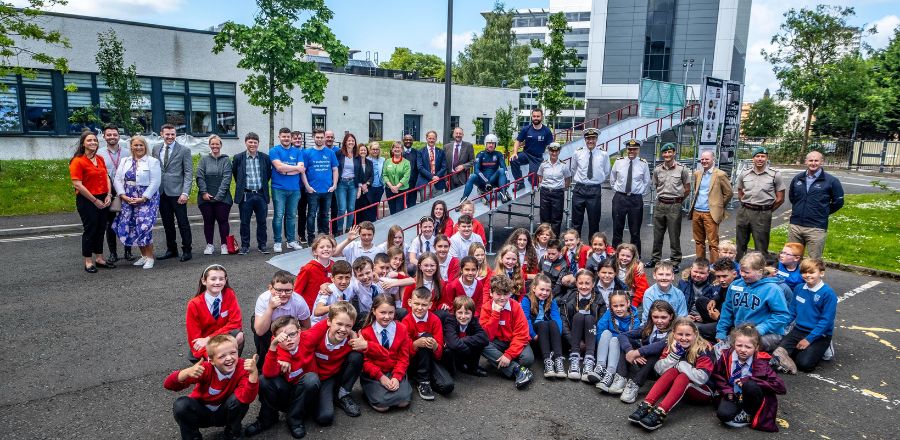GCU students design the world’s first mobile luge ramp

A group of GCU students recently concluded a huge project to create the world’s first mobile luge ramp, with the help of local primary school children.
Mechanical Systems and Computer-Aided Mechanical Engineering students helped design a 2.5m high and 13m long ramp, as part of a commission based project funded by the Royal Navy. Now completed, the ramp could potentially be used by the GB Luge Team to train for the 2026 Winter Olympics.
Working as part of a STEM partnership, the students were tasked with designing the ramp using the help of six Renfrewshire primary schools through a 10-month long project.
Now at the end of the project, the students were delighted to see their work being officially handed over to Team GB. Mechanical Systems Engineering student Mark Hughes worked as one of the project team members, and explained how happy he felt to see the successful end to the project. He said: “It feels really good, especially after working on it for such a long time.
We started officially last June (2021) to get all of the project specifications together and we started designing it during the summer, since we knew there was a lot of work ahead of us. It’s finally finished a year later but we’re really happy with how things have turned out.
The school engagement with the project has worked really well and the Navy seem to be happy with it which is good!”
He added: “I was the only Mechanical Systems Engineering student on the project, the rest being Computer-Aided Mechanical Engineers, so I was responsible for doing a lot of the calculations for it.
I did a lot of work involving the school engagement and even helped design some of the top parts of the ramp; e.g the handles, top platform etc.”
Now looking ahead to graduation, Mark has feels that this experience will serve him well in relation to his future job prospects. He said: “The project is essentially all engineering problem solving, finding new ways to do things if one method didn’t work. Sometimes we would have to adapt our designs to ensure it would work within our budget.
All of this has been really helpful in terms of my future career because I’ve now got experience of this type of problem solving, which is an essential skill for this area of work. To be able to work with the Royal Navy has been really cool, and it’s made me think about working with STEM engagement in the future.”
Computer-Aided Mechanical Engineering student and co-lead on the project Jakub Choluj was relieved to see all of their hard work pay off. He said: “Honestly, it’s been amazing! At the very start, we weren’t sure if there was going to be any delays with the project – but it’s finished, it’s done!
I was co-lead on the project alongside some other members. We had some challenges during the project, mainly making sure we could meet the deadlines for it but in the end we managed it and everything worked out.”
The experience was beneficial for Jakub in a number of ways, including helping him secure a graduate role as a Project Controller for Spirit AeroSystems. He said: “The experience has been amazing! The responses from future employers has been great.
Working on a project like this looks really good on a CV and it’s a really good talking point in interviews. It recently helped me find a job for after university as well!”
By Rachael McAlonan
Got a SCEBE or GSBS story? Email me at Rachael.McAlonan@gcu.ac.uk or connect with me on social media here
